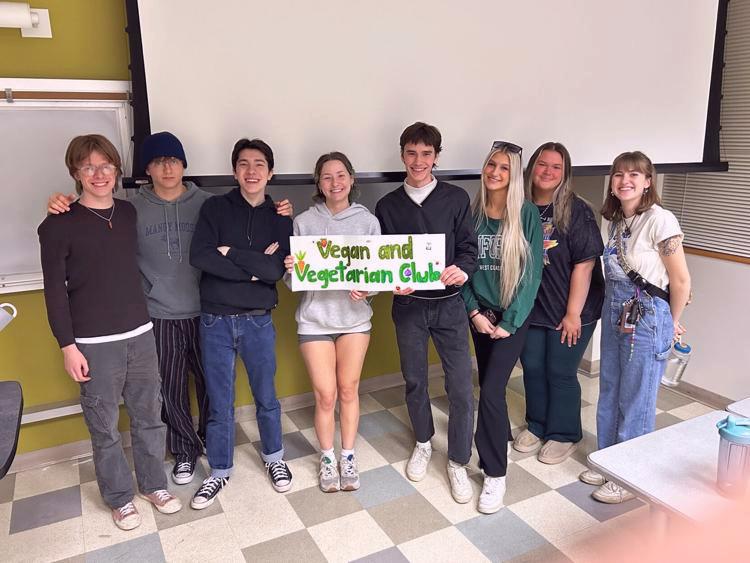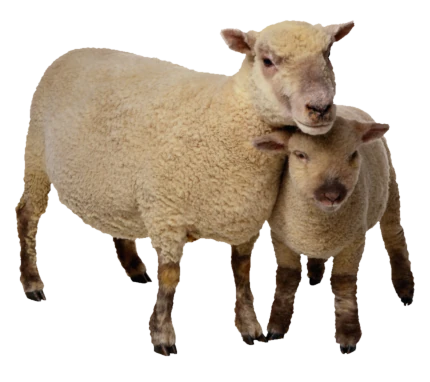In a world where dietary choices have become deeply tied with personal beliefs and environmental concerns, the University of Cincinnati (UC) Vegan and Vegetarian Club (UCVVC) stands as a beacon of inclusivity and advocacy for this cause.
With a mission to cultivate a welcoming space for vegans and vegetarians from all different backgrounds, the UCVVC goes beyond dietary preferences to create a community of like-minded individuals who share a passion for plant-based living or those who are just interested in learning more.
However, what truly sets this club apart is its open invitation to non-vegans and vegetarians, encouraging them to explore plant-based lifestyles, challenge their perspectives and engage in meaningful dialogue.
The club was started by two UC students passionate about the lifestyle, Gretchen Nieberding, a third-year secondary education student with a focus in social studies, and Jack Morgan, a second-year communications student.
The idea began when Morgan, who himself is a vegan, was roaming the club fair and didn’t see a booth that aligned with his lifestyle.
“Me and my friend were looking for a vegan and vegetarian club and there were environmental clubs that were similar to some of our own ideas, but nothing that was specific to veganism and vegetarianism,” Morgan said.
With their shared passion as fuel, Morgan and Nieberdig collaborated to bring their vision to life, officially establishing the club at UC in October 2023.
With a focus on plant-based living, the UCVVC aims to inform and inspire. Its core mission revolves around educating others and creating some perspective. Inclusivity is key, as the club welcomes all, providing a supportive space for individuals to connect and share.
The main goals of the club are to promote understanding, raise awareness and increase adoption of plant-based diets.
“Essentially, it’s about educating people on what plant-based diets entail and encouraging more individuals to embrace them,” Neiberdig said, “The club aims to create a supportive space for vegans, vegetarians, and individuals with other dietary restrictions to come together and have a space to just talk.”
Morgan and Nieberdig have the focus on holding educational events to keep the UC student body informed, especially about food consumption.
“Our main aim is to make people think about where their food comes from. You know, growing up, we’re just handed food without really questioning it. That’s something that bothers me personally. So, as a club, our main goal is to provide more information like what really goes on in factory farms or the impact of the food industry on the environment,” Morgan said.
However, as the co-presidents themselves have been vegans for quite some time, they are not forcing the lifestyle on members but just want to create a supportive community. They do have advice for those who are interested in transitioning to vegan or vegetarian.
“Take baby steps. You don’t need to immediately cut out meat and/or dairy all at once, going cold turkey can be very hard. Maybe challenge yourself once or twice a week by adopting the diet and slowly it will feel more natural,” Nieberdig said.
As their weekly meetings are open to everyone, including non-vegans and non-vegetarians, the executive board wants to make sure that everyone’s views and perspectives are heard and valued.
“We have a few officers who aren’t vegan or vegetarian, but they enjoy being part of our community. We value open discussion in our meetings and welcome non-vegans and vegetarians. It’s important to us to respect everyone’s views, whether you’re vegan, vegetarian, or a meat-eater. We are gonna respect our members’ opinions and we hope they do the same as ours,” Nieberdig said.
As the club grows, the team wants to make sure they are addressing all misconceptions people assume about adopting a vegan or vegetarian lifestyle.
“In our club, we want to focus on debunking misconceptions about veganism and how to defend the cause. We recently had a presentation addressing common arguments, to help others with the comments I get quite often once people find out I’m vegan. Our goal is to show that veganism can be flexible and accessible with the right resources,” Nieberdig said.
Nieberdig and Morgan are influential leaders at UC through their work with the club. They aim to spark interest in veganism and vegetarianism by sharing their stories and educational content at their weekly meetings.
“One piece of advice I’d offer is to consider the true cost of your food purchases. Whether it’s a cheap option like Costco chicken, it’s important to reflect on the environmental and ethical implications. Mindful eating involves being proactive in seeking out ethical and sustainable food options,” Morgan said.

